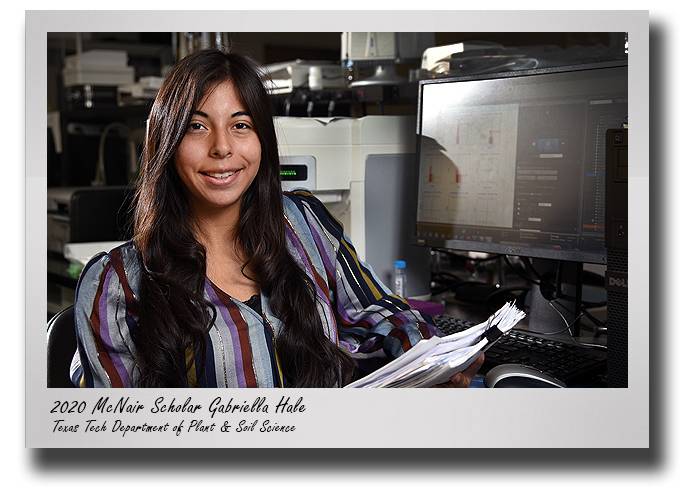PSS’s Gabriella Hale recognized as Texas Tech 2020 McNair Scholar
By: Norman Martin
 Gabriella Hale, a senior from the Department of Plant and Soil Science, is part of the ground-breaking
2020 Class of Texas Tech University's McNair Scholars Program, a graduate school preparatory
program for undergraduate students from historically underrepresented groups who've
demonstrated strong academic potential for graduate research.
Gabriella Hale, a senior from the Department of Plant and Soil Science, is part of the ground-breaking
2020 Class of Texas Tech University's McNair Scholars Program, a graduate school preparatory
program for undergraduate students from historically underrepresented groups who've
demonstrated strong academic potential for graduate research.
"This opportunity has been my first experience in hands-on research, from project design to data collection and interpretation," said Hale, who is one of 13 Tech students in the 2020 Class and the only one from the Tech's College of Agricultural Sciences and Natural Resources.

"Gaining research experience in a graduate-level setting has made all the difference in giving me the skills and confidence I will need to be successful in graduate school," she said "I'm thankful to be learning these skills now, as an undergraduate. I feel like the McNair Scholars Program has given me a head-start in pursuing research as a career path."
Guiding Hale down this highly-technical research path is Venugopal Mendu, Hale's mentor and an associate professor of cell wall biology in Tech's Department of Plant and Soil Science, and last year's winner of Tech's Chancellor's Council Distinguished Research Award.
"Gabriella is an excellent student and a hardworking undergraduate researcher," Mendu said. "I'm delighted to have her in my lab and she has been a productive member of the lab."
Hale's research focuses on "Investigating the Physiological Responses in Arabidopsis FKF1 mutant," which explores the complex phenomena of light mediated regulation of cellulose biosynthesis.
"We're working with a specific blue light receptor mutant – FKF1 – which showed enhanced cellulose and chlorophyll contents compared to wild type plants," Hale said. "It's hypothesized the mutants have higher photosynthetic efficiency due to enhanced chlorophyll content. Controlled environment plant growth chambers are being constructed to measure CO2 gas exchange."
Differences in gas exchange will allow for measurements of photosynthetic and respiration rates, she said. The hope to increase understanding of how the FKF1 protein is modulating physiological responses in order to co-ordinate development with delayed flowering time and increased cellulose content.
CONTACT: Venugopal Mendu, Associate Professor of Cell Wall Biology, Department of Plant and Soil Science, Texas Tech University at (806) 834- 6327 or venugopal.mendu@ttu.edu
1125M19
Davis College NewsCenter
-
Address
P.O. Box 42123, Lubbock, Texas 79409-2123, Dean's Office Location:Goddard Building, Room 108 -
Phone
(806)742-2808 -
Email
kris.allen@ttu.edu
